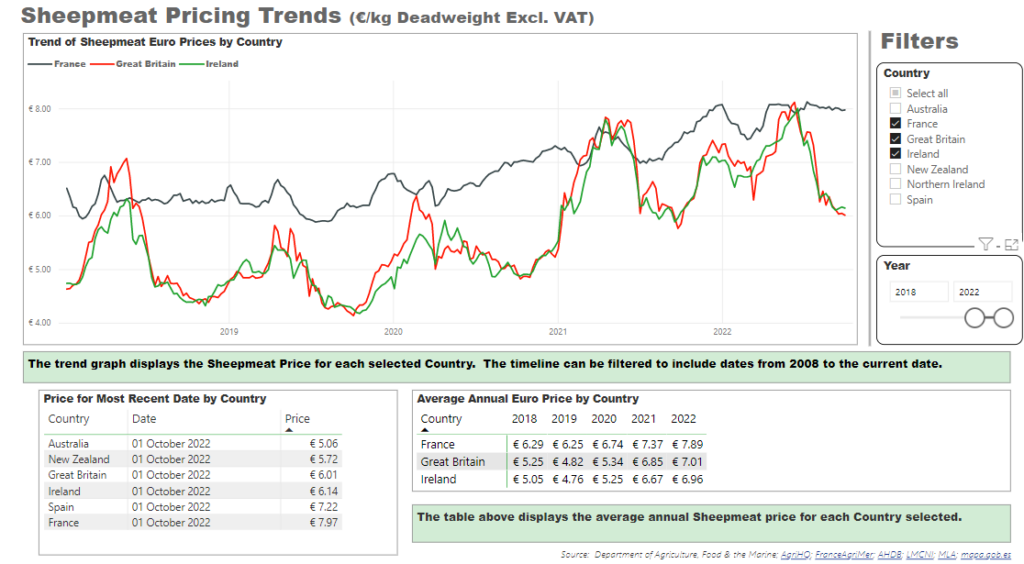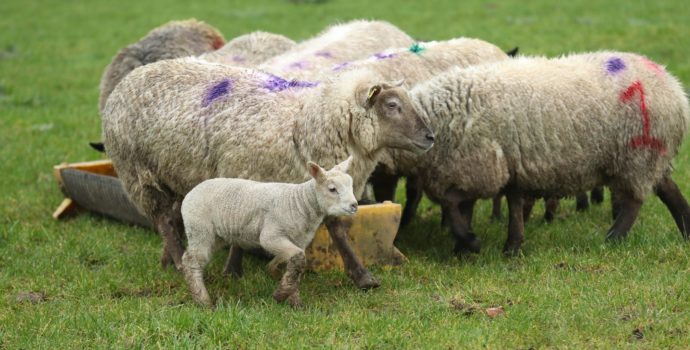Sheep Council Report October 2022

- Market Report
- Lamb Price: Spring lambs are making €6.10 to €6.40kg on weights to 22/kg. Cull Ewe prices are ranging from €3.00 to €3.50kg in general

- Supplies: Total throughput to date is 2,219,376 head which represents a 7% increase when compared to the same period in 2021. Spring lamb throughput is running 80,814 head or 7% behind the same period in 2021.

- Market Conditions; Lamb prices have steadied in the past week but inflation pressures have impacted demand on our domestic and key exports market which in turn has seen pressure on factory prices over the past month. Trade is now on par with 2021 prices but higher production costs are eroding these margins in comparison to the previous 12 months. Mart trade remains positive with good demand and competition for store and finished factory lambs.
- The EU lamb flock decreased by 3.7% in December 2021. A 2% decline in production is forecasted in 2022 as a result. Consumption is also expected to fall by 1.8% due to inflation and higher costs of living. No significant increase in global sheep meat supplies is expected in 2022
- Continued engagement with MII and sheep factory management.
- Increased QA Bonus: IFA continue to pursue an increase in the QA bonus to 30c/kg and have had discussions with Bord Bia, MII and factory representatives on the issue.
- Farmers are encouraged to sell hard while moving lambs as they become fit.
- IFA publish lamb price updates twice weekly and all of the latest data is available at www.ifa.ie
- Dog Control
- Committee members continue to promote the ‘No Dogs allowed’ campaign in their local regions and have been active lobbying local TD’s and Ministers for increased sanctions for irresponsible dog ownership.
- Following a meeting with Minister Humphreys and McConalogue in May IFA were given a commitment that increased sanctions and on spot fines for out-of-control dogs are under review and will be updated.
- IFA have written to both Ministers calling on a number of key issues that requires addressing.
- A single National Database for all dogs corelating licensing and microchipping and identifying the person responsible for the dog but at a minimum alignment of the existing licensing and microchipping records to one central access point.
- Full enforcement of microchipping and licensing obligations of dog owners for all dogs.
Stronger powers of enforcement for dog wardens and Gardaí and clarity of these powers.
- Increased on the spot fines for failing to comply with the microchipping and licensing requirements.
- Increased sanctions and on the spot fines for failing to have the dog under control.
- Significant on the spot fines for dogs found worrying livestock.
- Legal requirement for dogs to be microchipped and licensed and identified on the NVPS (National Veterinary Prescribing System) prior to any veterinary treatment or prescribing of medicines by veterinary practitioners.
- Authority to apply the legislative obligations to dogs in border regions owned by persons not resident in the state.
- Sheep Improvement Scheme
- IFA met senior DAFM personnel on October 6th and raised specific issues regarding the new SIS proposed terms and conditions set out in the CAP strategic plan.
- The scheme must have a funding allocation to deliver €30/ewe to all participant farmers.
- The reference period for the scheme must reflect the actual levels of activity on farms. New entrants to the sector must be categorised differently and allowed time to establish their flocks while participating in the scheme and have this recognised in the reference numbers.
- The requirement to nominate the year/s the genotyped/parentage verified action in the scheme on the first year of application must not be a compliance requirement.
- Once a farmer meets the requirement at any point within the term of the scheme it must be accepted as meeting the criteria.
- This measure must recognise home bred genotyped/sire verified rams.
- Throughout the duration of the scheme existing sheep farmers and new entrants who do not apply to the scheme in the first year must be accepted into the scheme if it is decided to partake in subsequent years.
- All farmers applying to the scheme that meet the eligibility criteria must be accepted into the scheme and paid on all ewes on the farm.
Early-stage support for Producer Organisations
- IFA met DAFM officials on October 6th on the newly proposed scheme.
- IFA have consistently called for existing producer groups to be included in the scheme recognising the vital role they play in supporting sheep farmers.
- Following various discussions with DAFM officials, all existing lamb producer groups will be eligible for application.
- IFA held a lamb producer group information meeting for all existing lambs producer groups in the country in June. DAFM officials were in attendance and presented details of the upcoming scheme.
- Wool
- IFA met British wool in Bradford UK on October 3rd to discuss on going wool issues.
- Discussion with British wool at the meeting demonstrate what can be achieved where a co-ordinated approach with Government support is provided in the promotion, marketing and processing of wool.
- Following the publishment of the wool feasibility study in July no further action has been taken by Government.
- €100,000 has now been spent and a lot of time lost while no further value has been added to wool.
- IFA has called for the immediate convening of the Sheep wool industry group to advance the process of adding value to Irish wool.
- IFA has sought the inclusion of shearing as an action in the new Sheep Improvement Scheme but the Minister and his officials have refused to include it.
- IFA has called on the Minister of Agriculture to come forward with proposals to support sheep farmers directly for the shearing costs with incentives to ensure the wool is presented in optimal condition for further added value uses.
- There are no immediate pathways identified that will increase the value of wool at the farm gate and direct support for farmers for this critically important animal health and welfare practice on farms must be provided.
- There are huge opportunities to develop a unique brand for Irish wool and this work must begin immediately.
- Electronic Funds Transfer
- IFA met MII and sheep factory management in July to further discuss EFT to be provided as an option of payment to sheep farmers.
- IFA has written to each sheep processing plant demanding the option to have payments issued to farmers through EFT.
- Committee members have made contact with their local factory’s on the issue.
- Input Crises
- IFA continue to seek additional direct supports for sheep farmers to offset the increased costs for feed, fertiliser and fuel on farms based of their levels of production.
- IFA has written to the Minister demanding immediate direct financial support for sheep farmers.
- Following IFA demands the Minister provided a €56m fodder support package providing farmers with a €100/ha payment up to a maximum of 10ha.
- IFA successfully secured Category A ANC land in the scheme following intense lobbying from Sheep committee members.
- IFA successfully secured a rollover of the fodder support scheme for 2023 in the recent budget.
- An advance payment for the 2023 scheme will be issued in December
- Brexit Adjustment Reserve (BAR)
- IFA have made a detailed submission on the Brexit Adjustment reserve setting out potential Mitigants and support measures for Sheep farmers impacted through Brexit.
- The BAR fund must be utilised to directly support sheep farmers to safeguard their farm income situation from the potential impacts of Brexit which looms over the sector.
- Direct / compensatory aid for revenue lost, paid direct to impacted farmers
Subventions on added cost of production.
Measures to explore the alternative use of wool (e.g. insulation; renewables;
etc.).
- Support paid direct to farmer to cover shearing expenses and present wool at
highest possible standard to minimise washing/cleaning requirements =
c.€8/ewe.
- Measures, including direct-aid to support improved performance, efficiency
and/or sustainability of the agricultural holding to support improved
income resilience.
- Measures to reduce reliance on inputs by directly supporting farmers to
implement measures that improve soil health and animal health leading to
higher production efficiencies, recognising time, labour and management
commitments of farmers to achieve same
- Measures to promote On-Farm Diversification.
- Measures to support Intergenerational Renewal / Collaboration type supports/models.
- Activity since last Council
- Met with British wool in Bradford UK on October 3rd to discuss on-going wool issues.
- Met DAFM officials on October 6th to discuss the Sheep improvement scheme and Early-stage support for Producer Organisations.
- Hosted a farm walk with the Ulster Farmers Union on August 10th to discuss sheep production issues.
- Met Bord Bia on August 4th for a Sheep market update.
- Hosted Bord Bia Paris office meat manager on sheep farm in Leitrim highlighting the standards of production on typical sheep farms
- Weekly publication of IFA Sheep price updates.
- Upcoming issues
- Continue to pursue supports to of set the impact of the input’s crisis on sheep farms.
- Ongoing contact with Bord Bia, processing plants and MII to progress IFA’s calls to advance the Quality Assurance bonus to 30c/kg
- Brexit Adjustment fund.
- Ongoing ‘No Dogs Allowed Campaign’.
- Sheep Industry Working Group.
- Participation in the Wool Council.
- €30/ewe payment.
- Ongoing contact with Sheep Ireland.




